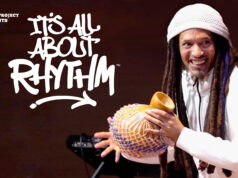Most musicians will, at one time or another, wish to play with others. This might mean hanging around and playing a few tunes in a friend’s living room or it could mean working with a full-fledged band.
Whatever the case, it’s crucial that any musician who wishes to play with others possesses simple listening skills in order to truly add to the music. While these skills are simple, they’re also highly important and effective, making them a great foundation on which to build your musical relationships.
Below are a few areas I find most important when attempting to truly tune in to the music being played, as well as some of my favorite tips for improving your listening skills.
A Tight Sense of Rhythm
Rhythm is the heartbeat of all music. It’s what ensures that a group of musicians remains constantly in sync and it’s one of the most important aspects of any piece you might play. Therefore, it’s very important that every musician, especially those who wish to play in group settings, have a strong sense of rhythm.
If you have trouble finding rhythms and playing to a specific beat (or at a certain speed), be sure to focus on these things during your practise. Some ideas for improving rhythm include clapping out a rhythm before playing it, audibly counting the beats of a song while listening to a recording, and practicing with a metronome.
An Accurate Sense of Pitch
A musician who plays off-pitch won’t be appreciated by his or her bandmates as the results are likely to be less than appealing! For this reason, pitch is yet another skill that simply must be mastered in order for a person to play well in a group.
Fortunately, even if you aren’t born with a perfect sense of pitch, there are ways to attain it. By purchasing a digital tuner, investing some time and effort, and following the steps in the article linked above, you’ll be well on your way to perfected pitch.
The Ability to “Jam”
There are a great number of unspoken rules when it comes to musical jam sessions. Many of these are obvious, such as tuning your instrument, learning before you play so you don’t mess up the song for everyone else, and sticking to the proper genre when choosing songs.
However, some jam session etiquette isn’t quite so obvious. Therefore, I suggest giving this article a read if you’re attending your first meetup.
An Ability to “Talk Music”
Listening to a couple of seasoned musicians speak can sometimes sound like listening to a foreign language. There’s a lot of music lingo out there and it’s important that all musicians learn the jargon in order to communicate effectively.
To get a good handle on this music slang, make an effort to attend jam sessions and other social events involving musicians. This will give you a chance to practise the lingo you do know and learn a bit more to boot.
That said, musical slang can also be learned through the use of online tutorials and forums as well as various music books.
Singing in Tune
Even if your voice isn’t your primary instrument, it’s highly important that every musician knows how to sing in tune. This might seem silly if you play an instrument like saxophone, harmonica, or didgeridoo. However, I have a very good reason for feeling this way.
You see, the voice is the first instrument a person ever uses. It’s also the only instrument that will always be with you no matter where you are and, likely, the instrument you’ll have the easiest time using without any practise when learning a song for the first time.
Finally, singing is the easiest and best way to hone your sense of pitch. All of these things come together and lead me to believe that learning to sing in tune is crucial to the success of any musician, especially one who wishes to play with other music makers.
If you are on a mission to learn to play in a group, I am certain these tips will help you on your way. So what are you waiting for? Get to work! Soon enough, you’ll be playing like a pro alongside musicians of all abilities.














